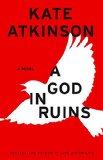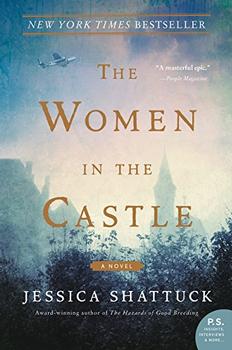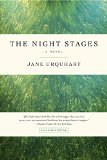Summary | Excerpt | Reviews | Beyond the book | Read-Alikes | Genres & Themes | Author Bio

A Todd Family Novel
by Kate AtkinsonThe title of Kate Atkinson's latest novel, a companion of sorts to her 2013 Life After Life, is taken from a quote by Ralph Waldo Emerson, which Atkinson includes as an epigraph: "A man is a god in ruins. When men are innocent, life shall be longer, and shall pass into the immortal, as gently as we awake from dreams." Right from the start, then, Atkinson uses her fiction to explore the idea of the imperfection of humankind. The Fall of Man if you want to get more traditional about it: the idea that humans have, since the very dawn of creation, fallen short of their own ideals.
In A God in Ruins, Atkinson explores this idea through the story of one man's life: Edward (Teddy) Todd, younger brother of Ursula Todd, the heroine of Life After Life. Teddy's life story, as told in this novel, extends from childhood through extreme old age, centering on what happened to Teddy as a bomber pilot in the Second World War. Throughout, Atkinson suffuses her narrative with images of primeval woods and rambling gardens, of humans' affinity with animals - in short, with glimpses of the world before that catastrophic Fall.
While Teddy's story does indeed begin with childhood and end with agedness, its chronology hardly plays out so neatly. In Life After Life, Teddy's sister Ursula lived her own life many times over, learning and imparting new lessons each time. The complexity and playfulness of that novel may give readers some clues that Teddy's story - under Atkinson's masterful pen - is hardly as straightforward as it seems. Sections of A God in Ruins are labeled with dates, but those are merely touchstones for what is, in actuality, a story that moves freely forward and backward in time, one that includes flash-forwards as well as flashbacks. The narrative is continually interrupted by glimpses of a future that hasn't even happened yet, treated as if it were a reminiscence, not a premonition: "But that was several weeks away yet, in the future," Atkinson writes after a long digression, for example, bringing us back to the present with a jolt. These kinds of narrative disruptions offer a new form of stream-of-consciousness, one that will keep readers alert and interested - and wondering just what it is the author is up to.
Atkinson introduces us to Teddy's idyllic childhood - the Eden of his imaginings - his young adulthood; his service in the military during World War II (described in excruciating and emotional detail); his seemingly inevitable but largely unexciting marriage to the girl next door; and his eventual struggles to do the right thing for his free-spirited and blithely irresponsible daughter and her two children, both young adults at the novel's close. Just as Life after Life encouraged readers to imagine countless possible paths for one individual's life, A God in Ruins encourages readers to consider how the vagaries of fate might affect what comes afterwards - a possible future time that, in the midst of the war, Teddy finds virtually impossible to imagine. "He had made a vow, a private promise to the world in the long dark watches of the night, that if he did survive then in the great afterward, he would always try to be kind, to live a good quiet life. Like Candide, he would cultivate his garden. Quietly. And that would be his redemption."
On the surface of things, Teddy's life "in the great afterward" is nothing particularly remarkable or noteworthy, perhaps not even anything that merits its own novel. But on balance, perhaps Teddy's life, as mundane as it is, is nothing short of miraculous - and perhaps that is true of all humans, with all their inadequacies. Atkinson's A God in Ruins is simultaneously a story of one man's harrowing journey through war, a family's journey through the twentieth century, and every person's journey through mistakes and shortcomings toward something resembling redemption, no matter how imperfect.
![]() This review was originally published in The BookBrowse Review in May 2015, and has been updated for the
January 2016 edition.
Click here to go to this issue.
This review was originally published in The BookBrowse Review in May 2015, and has been updated for the
January 2016 edition.
Click here to go to this issue.

If you liked A God in Ruins, try these:

by Jessica Shattuck
Published 2018
Three women, haunted by the past and the secrets they hold.

by Jane Urquhart
Published 2016
The Night Stages explores the meaning of separation, the sorrows of fractured families, and the profound effect of Ireland's wild and elemental landscape on lives shaped by its beauty.
If you want to build a ship, don't drum up people... but rather teach them to long for the endless immensity of the...
Click Here to find out who said this, as well as discovering other famous literary quotes!
Your guide toexceptional books
BookBrowse seeks out and recommends the best in contemporary fiction and nonfiction—books that not only engage and entertain but also deepen our understanding of ourselves and the world around us.